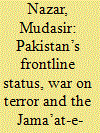| Srl | Item |
| 1 |
ID:
126166


|
|
|
|
|
| Publication |
2013.
|
| Summary/Abstract |
In this article I consider the interface between state policy and popular culture by examining the issue of nuclear weapons in and around Indian popular cinema. Whilst it has been pointed out that there are no cinematic examples of nuclear annihilation in Indian film, I propose instead that the threat of it is nevertheless evident. Nuclear technology is deeply entangled in anxieties about the nation, its constituents such as the family, and its detractors such as forces to do with communalism and separatism. These disquieting dynamics do not enable a straightforward alliance between the nuclear and the national as official state discourse would have it, where nuclear weapons are advocated as a measure of India's military might in the contemporary era, or in other words, 'nuclear nationalism'. Rather than being nation-builders, films present nuclear weapons as dangerous nation-destroyers, for missiles harbour threats to people and civilisations especially in the hands of the figurative terrorist and those with designs against the nation of India. With this formulation there lies a latent critique of state policy, which nevertheless is imbued with patriotic rhetoric by the end of the film, when the hero averts disaster and/or invokes the state as the paragon of nuclear management.
|
|
|
|
|
|
|
|
|
|
|
|
|
|
|
|
| 2 |
ID:
146873


|
|
|
|
|
| Summary/Abstract |
How Islamic parties in South Asia respond to the global ‘War on Terror’ (WOT) and politicise related issues remains largely covered in press reports, which are often not in English. This article seeks to analyse the responses of one influential Pakistani Islamic party, Jama’at-e-Islami (JI), as a leading voice of protest. It provides evidence that engagement with WOT has reactivated JI and has become a political commodity for Islamists in Pakistan, feeding hopes that they will play a larger role in future governments in Pakistan. However, there are also signs that such hopes will remain unrealistic if JI does not distance itself from extremism and curbs Islamists’ terrorist activities.
|
|
|
|
|
|
|
|
|
|
|
|
|
|
|
|